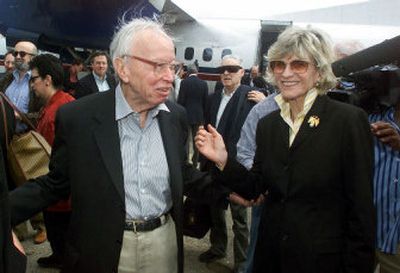Historian Arthur Schlesinger dies at 89

NEW YORK – Arthur M. Schlesinger Jr., the Pulitzer Prize-winning historian and Kennedy insider who helped define mainstream liberalism during the Cold War and remained an eminent public thinker into the 21st century, has died, his son said. He was 89.
Schlesinger suffered a heart attack while dining out with family members Wednesday night in Manhattan, Stephen Schlesinger said. He was taken to New York Downtown Hospital, where he died.
Among the most famous historians of his time, Schlesinger was widely respected as learned and readable, with a panoramic vision of American culture and politics. He received a National Book Award for “Robert Kennedy and His Times” and both a National Book Award and a Pulitzer for “A Thousand Days,” his memoir/chronicle of President Kennedy’s administration. He won a Pulitzer in 1946 for “The Age of Jackson,” his landmark chronicle of Andrew Jackson’s administration.
With his bow ties and horn-rimmed glasses, Schlesinger seemed the very image of a reserved, tweedy scholar. But he was an assured member of the so-called Eastern elite.
He was a longtime confidant of the Kennedys, a fellow Harvard man who served in President John F. Kennedy’s administration and was often criticized for idealizing the family, especially for not mentioning the president’s extramarital affairs.
After his election to the presidency, Kennedy appointed Schlesinger a special assistant, an unofficial “court philosopher” of symbolic, if not practical power. The high-minded historian was soon trapped in the tangle of superpower politics: the Bay of Pigs invasion in 1961, the disastrous attempt to overthrow Cuban leader Fidel Castro.
Schlesinger was opposed to the plan, he later wrote, but acknowledged helping the administration suppress a pre-invasion story by The New Republic that correctly reported the U.S. was training Cuban mercenaries. Had the press not cooperated, it might “have spared the country a disaster,” a regretful Schlesinger recalled.